MEP Biljana Borzan: Ban on Sale of Energy Drinks to Children Should Have Been Adopted in 2018
ZAGREB, 8 June, 2021 - Biljana Borzan, one of Croatia's members of the European Parliament, said on Tuesday that a motion by the Social Democratic Party (SDP) to ban the sale of energy drinks to children should have been supported in 2018 because the recent death of a 13-year-old youth in Zagreb might have been avoided.
MEP Borzan, who put forward a bill to ban the sale of energy drinks to children, told a press conference that this is an exceptionally important topic, however, the ideas and proposals by the opposition were ignored at the time.
"Had our proposal to ban the sale of energy drinks to children three years ago been adopted in the Sabor, perhaps this tragedy would not have occurred. I am nauseated to be here today as a mother and a doctor," she said, expressing her condolences to the family of the deceased youth.
She added that this was the first case of death of a child connected to the consumption of an energy drink and warned that if nothing was done, it would not be the last. "There is a considerable number of cases like this one in the world. Consumption of energy drinks by children is problematic for more than one reason," said Borzan.
By consuming energy drinks, children consume large quantities of sugar, which negatively impacts obesity statistics in Croatia. The second problem is the consumption of caffeine, taurine and other problematic and suspect substances while the third problem is that children's taste changes with such extremely sweet beverages so all other food becomes insufficiently sweet for them, Borzan said. The fourth problem is that the consumption of energy drinks in combination with alcohol is becoming more and more popular among teenagers, she added.
High blood pressure, heart attack, arrhythmia, headache, nausea, vomiting, cramping, panic attacks, anxiety, stress, diabetes, addiction, allergies, insomnia, risky behaviour, are just some of the repercussions of excessive consumption of energy drinks, she explained.
She recalled that in 2018, the SDP had proposed a bill to ban the sale of energy drinks to children under the age of 18, which was rejected by the ruling majority, which initially said that the EU did not allow this, said Borzan.
That is not true as some Baltic countries have such a law in force while retail chains in some EU countries have imposed such a ban on their own, Borzan said.
The government then said that it would introduce an additional tax in an effort to deal with that problem, which it did, Borzan said, noting that a ban would be far more effective and just as it would refer only to children.
Citing data from the European Food Safety Authority, Borzan said that the situation in Croatia was concerning as 86% of 16-year-olds consume energy drinks and 47% of them combine them with alcohol.
Sixty percent of children under the age of 12 who regularly consume energy drinks said they did so because they liked the taste, Borzan said, noting that it was bizarre that 40% of them said they consumed them because they lacked energy.
In addition to a ban, it is important to educate the public so parents don't buy these drinks for their children, she said.
Referring to an announcement by the government that it plans to establish an inquiry commission for this problem, Borzan said that this was a tardy response and warned that inquiry commissions had not resulted in positive changes in the past.
For more about health in Croatia, follow TCN's dedicated page.
Interior Minister Davor Božinović: Clear Link Between Croatia's Schengen Membership And EU Security
ZAGREB, 8 June, 2021 - The Strategy for the Schengen Area for the first time clearly articulates the link between Croatia's membership of the Schengen Area and the EU's security, Interior Minister Davor Božinović said in Luxembourg on Tuesday.
“The debate today on the Strategy for the Schengen Area is especially significant for us because for the first time it has identified a clear link between Croatia's membership of the Schengen Area and security for the EU as a whole," Božinović said ahead of a meeting of the EU's Home Affairs Council.
The interior ministers of EU member states met in Luxembourg on Tuesday for an initial discussion on the Schengen strategy that was presented by the European Commission last week. The agenda also includes the impact of the COVID-19 pandemic in the fight against organised crime, the internal security outlook in terms of artificial intelligence, cooperation in the fight against terrorism and exchanging opinions on the current status in the discussion on the new migration and asylum pact.
Last week the Commission presented the strategy towards a "stronger and more resilient" Schengen Area, which includes enlargement to EU member states that are still not part of the area, and called for Croatia, Bulgaria and Romania to be admitted into the Schengen Area as they had met the technical criteria for the application of the Schengen acquis.
Božinović said that it was becoming more and more clear that Europe's security was not the sum of security capacities of member states but that it was cooperation, interoperability and solidarity.
"These are the principles that Croatia has insisted upon in European forums for years," said Božinović.
For more about politics in Croatia, follow TCN's dedicated page.
Number of MPs Allowed to be Present in Parliament Chamber Increased To 71
ZAGREB, 8 June, 2021 - Croatian Parliament Speaker Gordan Jandroković said on Tuesday that the number of MPs allowed to be present in the Parliament chamber at the same time would be increased from 41 to 71 following an improvement in the epidemiological situation.
A total of 77 persons may be present in the Parliament chamber at the same time. Given that government representatives and administrative staff are always present, we have agreed that 71 MPs can sit in the Parliament chamber at the same time, while others will be sitting in other rooms," Jandroković told the press after a meeting of the Parliament Presidency.
The Croatian Parliament has 151 seats.
He noted that wearing face masks would continue to be mandatory. MPs will be allowed to take off their mask when speaking from their seat or addressing the chamber from the lectern from behind a plexiglass shield.
For more about politics in Croatia, follow TCN's dedicated page.
Highlights of the Week: 5 Big Events in Croatia from May 31- June 6, 2021
June 6, 2021 - TCN's highlights of the week. A look at the events in Croatia from May 31 through the selection of TCN's reporter Ivor Kruljac.
From significant political changes after the local elections to the losses and preparations in sport, the week was hyped by a strive for hope in Croatia. But, the tragic murder of Nino Čengić in Varaždin was a painful kick to the stomach. Here is another weekly selection of the news depicting the bittersweet life in Croatia.
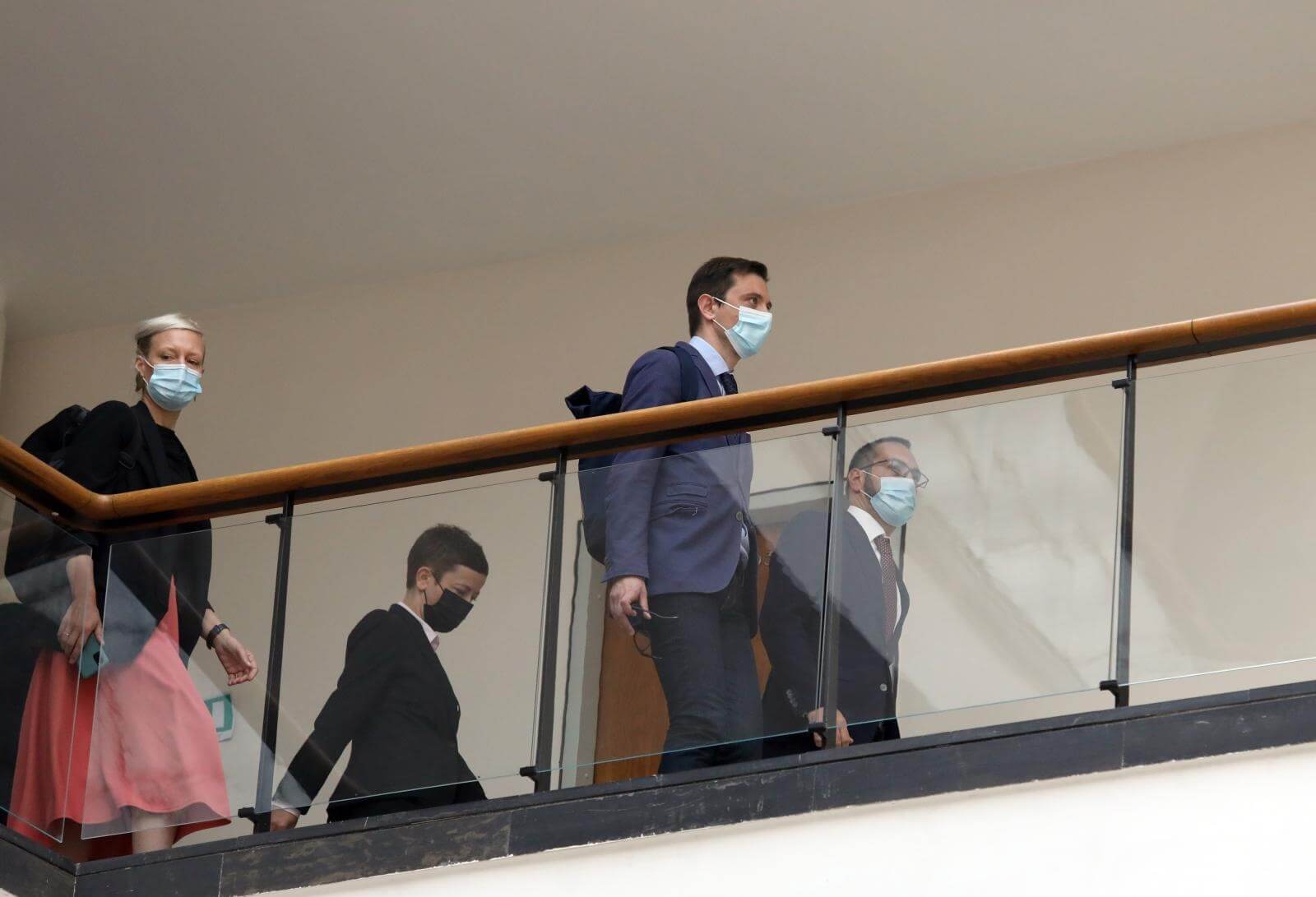
© Patrik Macek / PIXSELL
Highlights of the week: Tomislav Tomašević officially. becomes the new mayor of Zagreb
Zagreb local elections winner Tomislav Tomašević met with Jelena Pavičić Vukičević for an official ceremony of transferring power on Friday, which makes Tomašević officially the new mayor of Zagreb.
Media attention was also caught for the fact that Tomašević was four minutes late to the ceremony because he was waiting for the ambulance on Cibona because a woman fell ill in the middle of the street. But, for the bigger public interest, it's important to note today was the first time for Tomašević to have a detailed view on the financial situation of the City of Zagreb, giving him a clear picture of the debt problem Zagreb has.
As TCN reported earlier, Tomašević told the press after the ceremony that the situation is not good, but there are solutions. Still, so far, no more details were given on the two-thousand-odd-page reports on the 2020 budget execution and preliminary figures. Additionally, the new city assembly would hold the founding meeting on 17 June.
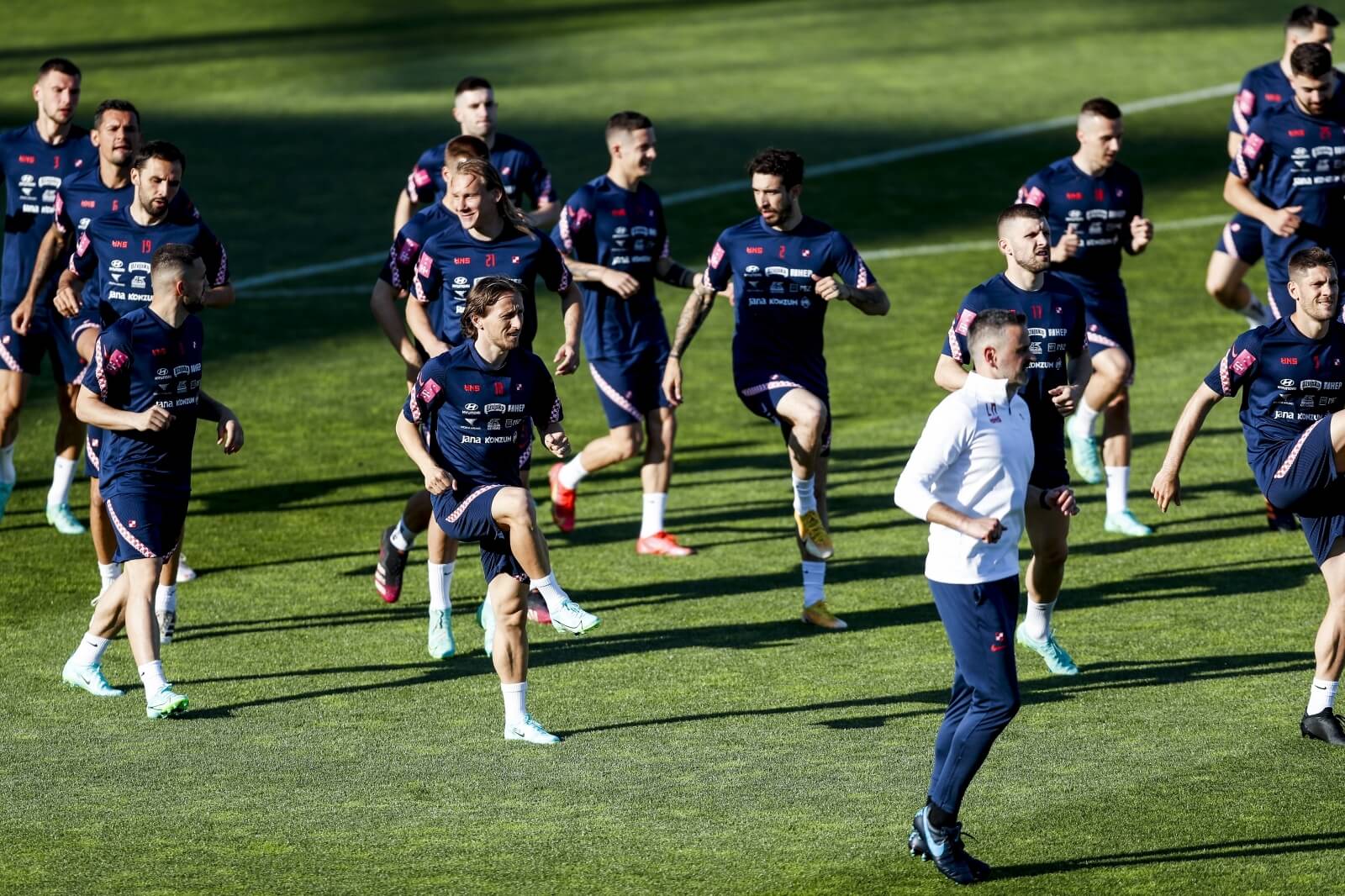
© Slavko Midzor / PIXSELL
Highlights of the week: Zlatko Dalić on Croatian National Football Team
The Croatian National Football Team is preparing for the friendly clash with Belgium. As reported by TCN, Zlatko Dalić faced the press on Friday ahead of the match.
„I am satisfied with everything except the result. We had minor injury problems. We did the rest as expected, but the draw with Armenia left a bitter taste. In that game, we had to win 4-0 or 5-0, not draw 1-1. I am dissatisfied with this result. Plus, we created 5-6 percent chances, and we didn't do that in three games in a row at the beginning of the World Cup qualifiers against Slovenia, Cyprus, and Malta. We were nonchalant and irresponsible and did not realize them. We were not specific, and that is a minus“, said Dalić to the press.
Dalić also pointed out that the national team is aware of its obligation to the Croatian people. He spoke about the problems in the national team, the pros and cons of the draw against Armenia, and the expectations from players who are dissatisfied with their status. One of them is Andrej Kramarić, who, after 20 goals scored in the Bundesliga this season, is not safe among Dalić's starters. A few days ago, he advised the media to ask Davor Šuker what he would say after such a season.
Expectionsare big ahead of the EURO championship, and no doubt fans will pay attention with close interest.
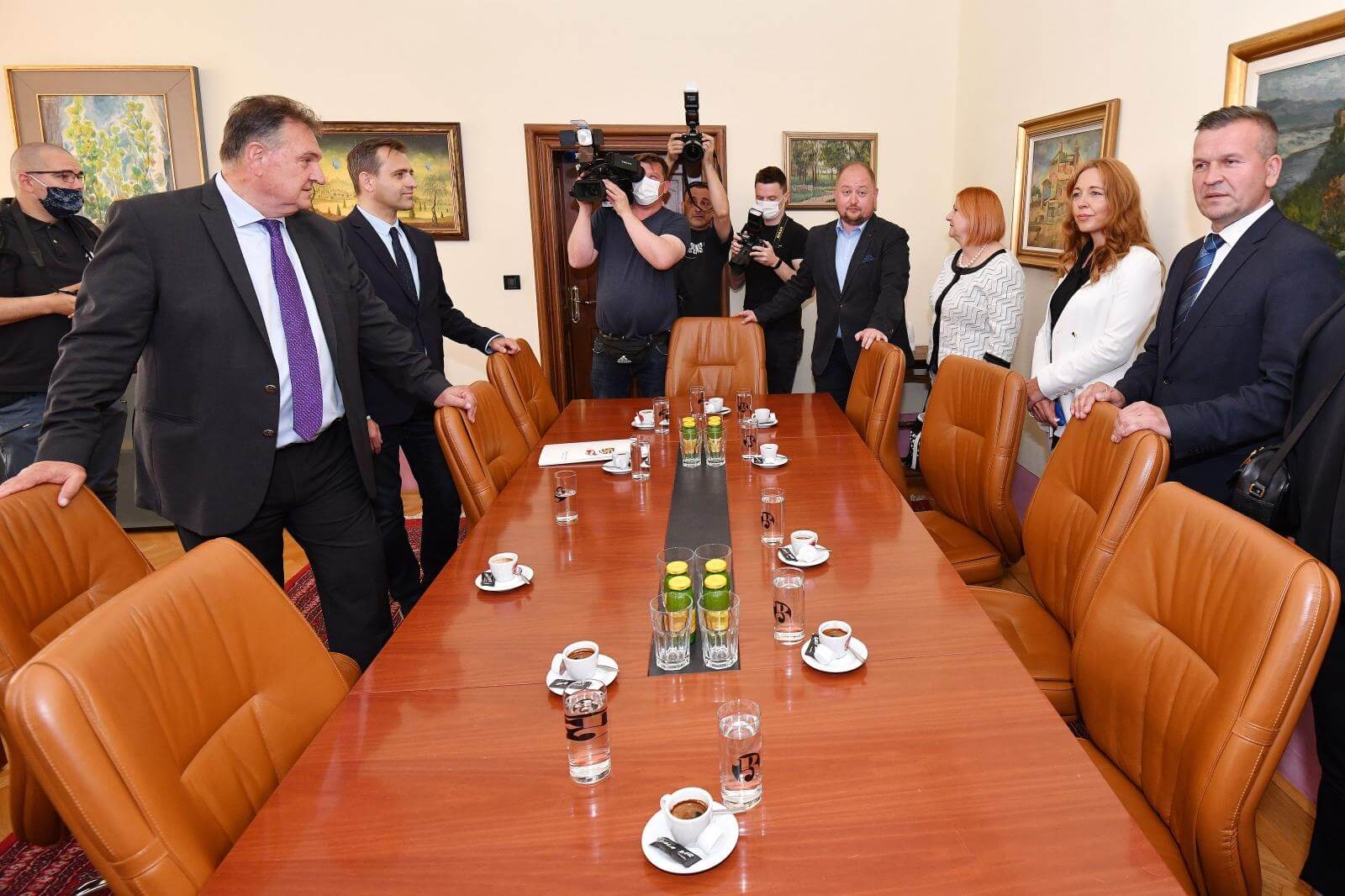
© Vjeran Zganec Rogulja / PIXSELL
Highlights of the week: Anđelko Stričak, new prefect
The power transfer ceremony on Friday also took place in Varaždin where Anđelko Stričak defeated current Varaždin prefect Radimir Čačić.
„The victory is well deserved. In the past nine years as the president of Varaždin county organization of the Croatian Democratic Union (HDZ), and in six years as a member of the parliament, I've been to every corner of Varaždin county and talked to everybody. I heard the needs of our citizens, and I tried to solve them by cooperating with coalition partners on every level. Of course, I'm not the best, most capable or most perfect, but I will try with my team to give my best that everybody in the county feel changes for the better“, said the new Varaždin County prefect Stričak, as reported by Varaždin county's official website.
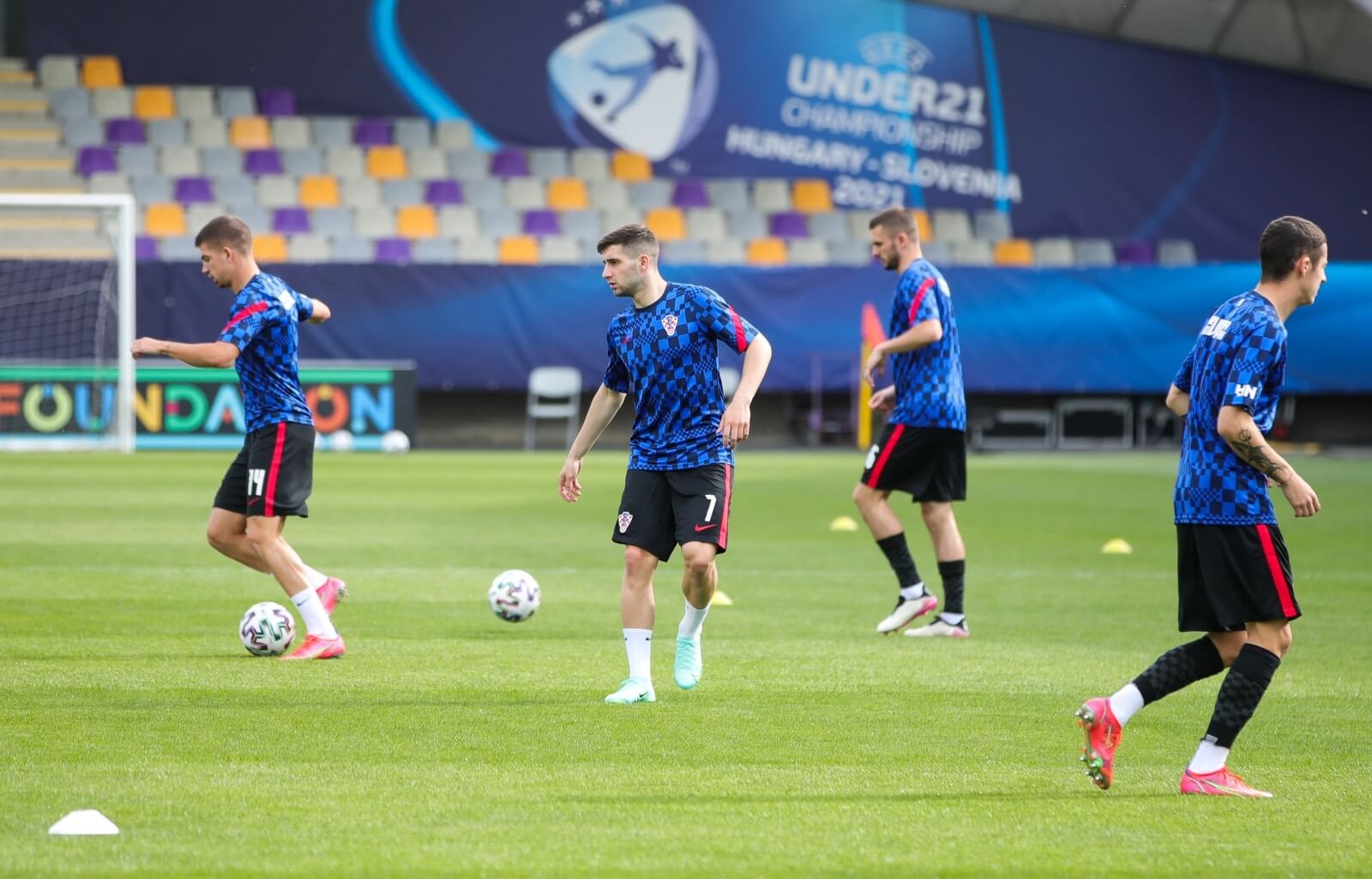
© Sanjin Strukic / PIXSELL
Highlights of the week: Croatia Loses to Spain in the Under-21 European Championship
Spain was better than Croatia after extra time in the Under-21 European Championship quarter-final in Maribor on Monday. The match ended 2:1. As reported by TCN, Croatia was solid in the first half and threatened the Spain goal on a few occasions. Despite Spain's high pressure, Ivanušec had a chance from 20 meters in the 7th minute, and in the 23rd, Bradarić's shot was blocked by the Spain defense. Spain retaliated with a Diaz shot from 20 meters, but Croatia's defense made it difficult for them to do much more.
The young Croatia national team fought against Spain for a spot in the semifinals.
Igor Bišćan's side met Spain at Ljudski Vrt stadium in Maribor.
"The guys are aware that we have a great chance, they are motivated to do something, and we are all around them to give them that chance and be supportive. They have quality," Bišćan announced before the match. 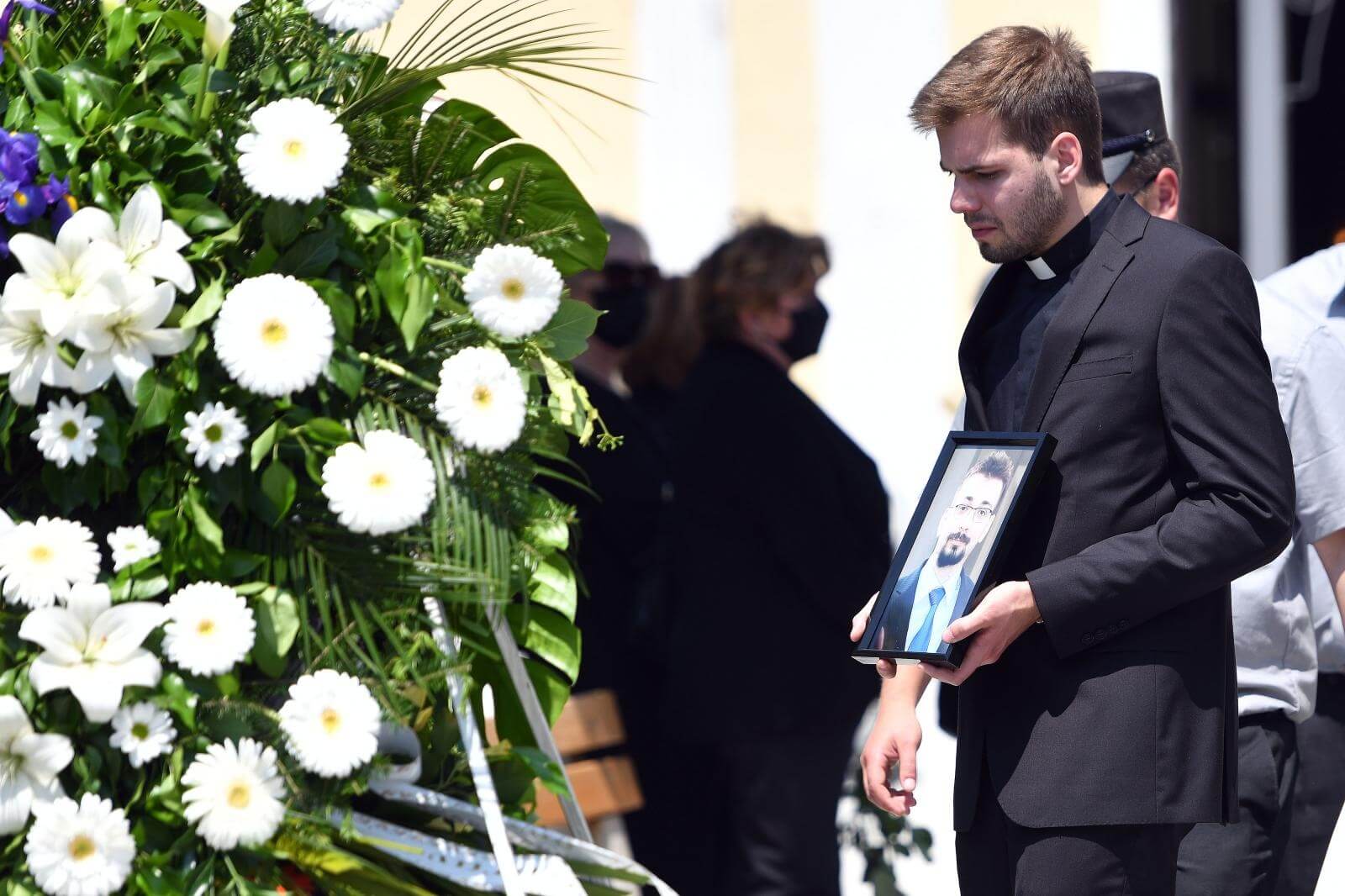
© Vjeran Zganec Rogulja/ PIXSELL
Highlights of the week: Nino Čengić funeral in Varaždin
The Funeral of the English professor Nino Čengić who passed away last Sunday, was held on Wednesday. Nino Gengić, a substitute English professor in one Varaždin school, was brutally beaten with bats and chains in front of the local club in Varaždin called Kulturana. He was 35 years old.
As Jutarnji List reports, four suspects aged 24-29 are currently in custody while the investigation is ongoing as to what lead to this attack. Suspect's apartments were searched, and one suspect illegally possessed a considerable amount of ammo and fire weapons to match. All suspects were previously known to the police for troubling behavior, and the most tragic was the fact that 15 people witnessed the beating, but nobody stopped it.
To learn more about Croatia, have a look at our TC website.
For more about news in Croatia, follow TCN's dedicated page.
Friends of Croatia: Diplomatic Immunity
June 3, 2021 - The seventh article in the series, Friends of Croatia: Diplomatic Immunity brings you more details on diplomatic immunity, its boundaries, and examples of exceptions in accordance with the International Vienna Convention on Diplomatic Relations. Details on how the sentry Ministry of Foreign and European Affairs, are included too.
Being a diplomat isn't bad at all. You get to travel and explore the country you are assigned to, experience the new culture while promoting your own. Additionally, you work on improving bilateral relationships and contributing to the dynamic of the geopolitical scene (hopefully for the better).
Earlier in the series, there was an article dedicated to the key terms of diplomacy. But, there is one more thing that is worth giving special attention to: diplomatic immunity.
You probably might be thinking that means exemption from legal prosecution, and you are kinda right. But that doesn't just mean you can just do whatever you want, and law-abiding behavior is, of course, one of the needed characteristics to fit the job description.
In fact, the International Vienna Convention on Diplomatic Relations from 1961 has very clear instructions.
„The person of a diplomatic agent shall be inviolable. He shall not be liable to any form of arrest or detention. The receiving State (a State in which the diplomat is based) shall treat him with due respect and shall take all appropriate steps to prevent any attack on his person, freedom or dignity“, says article 29 of the Vienna convention. Its also worth adding that the same protection applies for his/her private residence, as well as papers and correspondence, and the diplomatic agent is also not obliged to give evidence as a witness.
But, for not everything to be all benefits and no responsibilities, article 31, despite repeating that „ a diplomatic agent shall enjoy immunity from the criminal jurisdiction of the receiving State and that diplomatic agent „shall also enjoy immunity from its civil and administrative jurisdiction“ – he lists exception. Such as in the event of a real action relating to private immovable property situated in the territory of the receiving State, (unless he holds it on behalf of the sending State for the purposes of the mission) or in the case of an action relating to succession in which the diplomatic agent is involved as executor, administrator, heir or legatee as a private person and not on behalf of the sending State and finally, in the event of an action relating to any professional or commercial activity exercised by the diplomatic agent in the receiving State outside his official functions.
Additionally, „the immunity of a diplomatic agent from the jurisdiction of the receiving State does not exempt him from the jurisdiction of the sending State“.
Ministry at your (diplomatic) service
With the Croatian Ministry of Foreign and European Affairs already stating for this series that they take diplomatic relations very seriously, they respect the convention, and their Diplomatic Protocol Office is here to help. As evident in their protocolar guide, they have an entire section dedicated to privilege and immunity.
„Diplomatic missions and international organizations accredited in the Republic of Croatia notify the Ministry of Foreign and European Affairs, to the Diplomatic protocol arrival of the (diplomatic) mission, attaching the diplomatic note, and the copy of the passport that will be notified“, states the guide in respects to the International Vienna Convention on Diplomatic Relations. The guide adds that when stepping on duty, the Diplomatic protocol will have a view in the passport of a notified person, and it will place a stamp with the following content that will confirm the passport was reviewed by the Ministry. Along with the date and signature to match. This leads to issuing a special identity card that then allows entering the Republic of Croatia without a visa.
„The special ID is issued to the members of missions and consulate offices, members of the UN organizations, and other specialized UN institutions, members of international organizations accredited in the Republic of Croatia, as well as members of their families or members of the shared household and members of private service“, elaborated the guide.
With the aforementioned documents, to get the ID, diplomats must also provide their photos and fill in a questionnaire which can be downloaded from the guide.
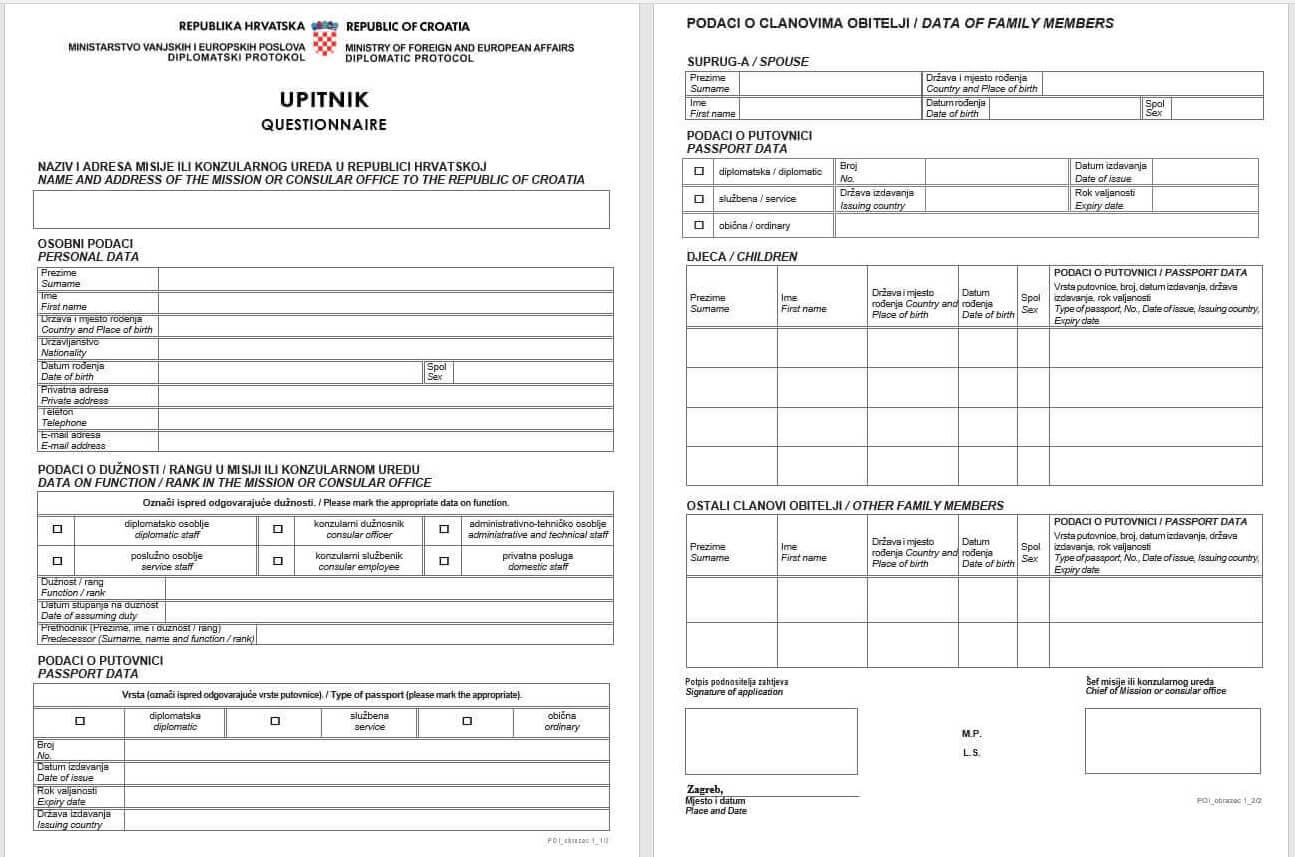
Diplomatic protocol questionnaire/screenshot, Total Croatia News
To read more from the series "Friends of Croatia", follow TCN's dedicated page.
For more about diplomacy in Croatia, follow TCN's dedicated page.
Finance Minister Zdravko Marić Says Croatia in Safe Financial Zone
ZAGREB, 2 June, 2021 - The budget revision, proposed by the government today, keeps Croatia in a safe financial zone, Finance Minister Zdravko Marić said after the cabinet's meeting on Wednesday.
The proposed budget changes set the general government deficit at 3.8% of GDP, and the government believes that this increase still keeps Croatia in a safe zone in terms of economic and other activities as well as in terms of the opinion of credit rating agencies and the European Commission, he added.
The government is committed to reducing the public debt from 88.7% to 86.6% of GDP, this year, Marić said, announcing one more revision of this year's budget.
The proposed revision, adopted today, will probably be on the government's agenda next week.
The minister said that he was looking forward to a meeting with Zagreb's new mayor Tomislav Tomašević, and that he and his team would be at the disposal of the newly elected local authorities.
"As far as Zagreb is concerned, I am sure that the mayor and I will meet to discuss several things," he said, explaining that with regard to additional borrowing, laws were clear and applied equally to everybody.
Among the topics to be discussed with Tomašević is a limit on borrowing, he said in a comment on the topic of possible new borrowing, explaining that the amount needed to service debts and cover loan guarantees this year must not exceed 20% of last year's revenue.
With regard to the purchase of fighter jets for the army, Marić said that the government would be guided by pragmatic criteria only. Therefore, a certain amount could be paid as an advance this year, he added.
For more about politics in Croatia, follow TCN's dedicated page.
Opposition: It's Not Good That PM Plenković is Trying to Intimidate Media
ZAGREB, 2 June, 2021 - Recent frequent attacks on media, reporters and political analysts by Prime Minister Andrej Plenković were met on Wednesday with condemnation by opposition MPs, who called on him to accept criticism and on media not to allow to be intimidated.
Social Democrat Arsen Bauk said the prime minister had opted for the "attack is the best form of defence" approach.
"Some defeats at local elections are painful for the HDZ, notably the prime minister, because he chose or imposed some of the candidates. It is not good for the prime minister, who has both objective and real power, to try to square accounts with or intimidate reporters, media and their editors and owners. I hope you will not let yourself be intimidated by him," Bauk told reporters in the parliament.
Judging by their response, I can see that they are not intimidated, he said, adding that he was fascinated by Plenković's claim that rival broadcasters had colluded to devalue the HDZ's candidate for Zagreb mayor.
Stephen Bartulica of the Homeland Movement said that media were possibly responsible for the latest developments because they had been very mild towards Plenković from the start.
"I definitely support media freedoms and it is not unusual that media in Croatia and the rest of the world are leaning to the left, but I think that what is more important here are the so-called independent analysts who often have material interests and certain relations with political camps and NGOs and who act in public as if they were unbiased," said Bartulica.
The sole MP of the Reformists party, Natalija Martinčević, who chairs the parliamentary Media Committee, said that the prime minister was very nervous, which she considers inappropriate.
"Communication with the media must be civilised. We are all expected to behave that way and so is the prime minister. There is no justification for his behaviour," she said.
Most MP Marija Selak Raspudić said that media had been the PM's fetish for a long time.
"Let me remind you of his high school graduation thesis 'Means of Mass Communication' in which, apart from extensively quoting (Yugoslav Communist politician Edvard) Kardelj and Marx, he also says that the Party is the one to control all information in society. He then advocates some democratic trends and says that media should be democratised, but it seems that as an experienced politician he has accepted the principle that the Party should control all information and is surprised when he does not manage to do it," said Selak Raspudić.
HSLS MP Dario Hrebak said that every politician had their own style of communication, noting that the prime minister was evidently irritated by something.
"I, too, am sometimes unhappy with the media but everyone has the right to say what they think, I would not be a liberal if I thought differently," he said, adding that he believed the prime minister would mend his relationship with the media and some reporters.
aFor more about politics in Croatia, follow TCN's dedicated page.
Interior Minister Davor Božinović : Croatia's Schengen membership in interest of EU
ZAGREB, 2 June, 2021 - Interior Minister Davor Božinović said on Wednesday that Croatia's entry to the passport-free Schengen Area was in the national interest as well as in the interest of the European Union.
Earlier on Wednesday the European Commission called for the enlargement of the Schengen area to include Croatia, Bulgaria and Romania, which have met all technical criteria for membership.
"Schengen's future must be marked by the expansion to those EU Member States that are not yet part of the Schengen area," the EC said while presenting the strategy for making the Schengen area stronger and more resilient.
Božinović recalled that Croatia had met 281 requirements in eight different segments concerning the membership criteria.
The minister is confident that Croatia will be admitted to the Schengen area in the next 12 months.
He said that he was glad to see that in Europe awareness was being raised about the importance of accession of Croatia, Romania and Bulgaria.
40,000 EU Digital COVID certificates issued in Croatia since first day of issuance
Since yesterday, when the issuance of EU Digital COVID certificates started in Croatia, as many as 40,000 such travel passes have been issued.
Božinović said that Croatia was among the first EU countries to make this system operational.
The minister, who visited the Bregana border crossing to get acquainted with the functioning of the system of checking those certificates, said that it took only 10 seconds to check those certificates.
One million kuna has been invested in this project, which included IT solutions, the necessary equipment of border crossings to be able to read the codes from the certificates, and other equipment for the Croatian Health Insurance Agency (HZZO), he said.
Croatia tapped EU funds for this purpose, Božinović said at Bregana.
ENTER Croatia application available to people travelling to Croatia
The minister said that people traveling to Croatia can fill in the ENTER Croatia application which will also facilitate passage across the border.
New, relaxed rules for arrivals in Croatia
As of today, some relaxed rules go into force for arrivals in Croatia, including a negative PCR test for coronavirus not older than 72 hours, while travellers who have received at least one vaccine dose at least 22 days before their arrival do not need to self-isolate.
For more about diplomacy in Croatia, follow TCN's dedicated page.
Associations Request Urgent Meeting With PM Andrej Plenković on Regular Public Transport
ZAGREB, 2 June, 2021 - The Croatian Employers' Association (HUP) and the SSSH trade union federation have asked Prime Minister Andrej Plenković for an urgent meeting on the regulation of regular public transport, stressing that if the meeting is not held, they "will be forced to take certain joint activities".
The answer and the date of the urgent meeting are expected by Friday, 4 June, at the latest, the associations said in a letter to the prime minister.
Employers and unionists say they have been "more than active" in proposing solutions and "more than patient" over the last three years, waiting for the final implementation of European and national regulations.
The HUP and the SSSH warn that the already ready legal solutions that were a prerequisite for signing contracts for regular public passenger transport on county and inter-county lines up to 100 kilometres are not implemented due to the inactivity of state administration bodies.
They also said that the decision had not yet been made on the distribution of funds from the state budget to counties, even though the funds, according to the SSSH and the HUP, had already been secured, and that public service contracts between counties and private transport companies involved in regular public passenger transport had not been signed yet.
"Private bus carriers from the HUP transport association account for 80% of the public transport on county and inter-county lines up to 100 kilometres and employ over 7,000 workers who are directly affected by such irresponsible behaviour of the relevant ministries," the HUP said.
Without a public service contract, the process of collective bargaining to improve working conditions in the transport sector is at a standstill and existing jobs are in jeopardy, they noted.
The operation of most public bus lines is at risk, especially in rural areas, and workers and private public transport providers haven't been able to plan their business and their companies' prospects for three years now, the HUP and the SSSH warned.
The HUP and the SSSH think that the government should make a decision on the distribution of funds from the state budget to counties (signatories of contracts with transport companies) at its next session.
They added that it was also necessary to stop discrimination against private bus carriers and their workers in relation to carriers owned by the public sector since private companies still didn't have public service contracts, while public companies did, for the same service.
They also think that it is necessary to continue with the job-retention subsidies for all companies that continue to register a decline in business and meet the prescribed criteria.
That is especially important, they said, for passenger transport on lines in rural areas, where the number of passengers is declining sharply, also because of the end of the school year and the holidays, and cannot be sustained without state support.
For more about politics in Croatia, follow TCN's dedicated page.
European Federation of Journalists (EFJ) Joins in Condemning PM Plenković's Statements
ZAGREB, 1 June, 2021 - The European Federation of Journalists (EFJ) has joined the Croatian Journalists Association (HND) and the Croatian Journalists Union (SNH) in condemning Prime Minister Andrej Plenković's verbal attacks on media and reporters after the local runoff election on 30 May.
The HND said on its website that EFJ Secretary-General Ricardo Gutiérrez described as "totally unacceptable that journalists are being attacked by both the Prime Minister and, just recently, the President of Croatia."
"Blaming journalists in this way is an attempt to undermine their credibility in order to limit their role as a counterweight. To insult or threaten journalists is to insult and threaten citizens, and to undermine the right of citizens to access free, independent information," the HND quoted Gutiérrez as saying.
The EFJ said on its website that shortly after the second round of local elections in Croatia, Plenković once again attacked the media, accusing them of "being paid to vilify a political camp" and accusing Dražen Lalić, an analyst and professor at the Zagreb Faculty of Political Science, of being paid by broadcasters to smear HDZ candidates, targeting also HND president Hrvoje Zovko, who strongly condemned his attack on the media.
The EFJ carried a statement issued on Monday by the HND and SNH in which the two organisations deplored "the open threats PM Plenkovic has made against all our colleagues and media which do not follow his and the HDZ's ideology.
"To name all those who critically speak about candidates ahead of elections and to mark as targets 'those who calumniate people for money' is not the kind of discourse that should be used by politicians, let alone prime ministers of civilised and democratic EU countries," the two organisations said in the statement carried by the EFJ.
The EFJ also quoted the HND and SNH as saying that such attacks only show Plenković and his HDZ party's ambition "to completely control the public sphere and determine the limits of media freedoms in Croatia".
For more about politics in Croatia, follow TCN's dedicated page.


